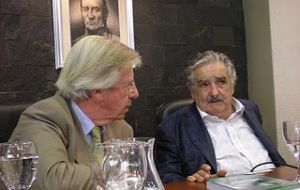MercoPress. South Atlantic News Agency
Uruguay with “two economic teams, let us not play with fire” warns top economist
 Mujica (R) and Astori seem to have conflicting views on economic policy and it is surfacing
Mujica (R) and Astori seem to have conflicting views on economic policy and it is surfacing The academic director of a Conservative think-tank, questioned Uruguayan president Jose Mujica attitudes and expressed the growing concern in the local business community and internationally about the fact the country seems to have two different economic teams.
“The most specific concern refers to this idea extended in the country that Uruguay has two economic teams, at odds, when not in conflict, and the fact that the economic course laid out when the current ruling coalition took office for the first time in 2005, is constantly being questioned from inside the coalition”, said economist Ernesto Talvi from think-tank Ceres.
Addressing a gathering of business people Talvi warned about the dangers of having these internal disputes regarding economic policy, “unfortunately we don’t know what is the course the country has taken and even more distressing, we don’t know what course will the government opt for in case of financial difficulties”, because of the current global crises.
The conservative economist said that Uruguay faces the “possibility, which must not be discarded, of having to face a major global crisis” and before such a possible scenario “it’s no time for disarrays or ambiguous signals, but rather a moment of transmitting certainties”.
He went on to emphasize, “let’s start by the beginning: the government has an only economic team, only one, let us not play with fire”.
“There is a clear perception of a power vacuum, ambiguous signals which leave a feeling of disarray and confusion. A feeling of improvisation, lack of firm course, I might say that the country is adrift”, emphasized Talvi.
In the current administration of President Mujica there are serious and evident discrepancies on economic policy between those economists more inclined to a greater role of the State in the economy, and those more orthodox, market oriented belonging to former Economy minister and currently Vice-president Danilo Astori.
These discrepancies have surfaced and strongly in issues such as a VAT rebate (currently at 23%), a tax on landholders with over 2.000 hectares, on promoting domestic demand rather than savings, all of which almost became a public boxing match, but did not impede extensive insults’ exchange, between Economy minister Fernando Lorenzo (Astori) and his Deputy Luis Porto (Mujica).
When the ruling coalition took office in 2005, one of its first decisions was to implement the personal income tax with the promise of a gradual reduction of VAT. None of this has happened and the Mujica team wants promises to be honoured. On the other hand the tax on landholdings was resisted by the Astori team arguing it means a change in the rules of the game.
To make things more complicated President Mujica was filmed wearing a Venezuelan Army jacket during a recent regional summit in Caracas and only this week the Uruguayan leader openly recommended that Uruguay should go around the world begging for funds for science research “as the street boys ask for a dime at traffic lights”.
Following Talvi the Argentine economist and taxing expert Miguel Kiguel talked about recent events in Argentina and what these could mean for Uruguay.
Kiguel said Argentines will continue to find difficulties in having access to dollars and this “somehow will have an impact on Uruguay, its tourist industry and investments”.
The Argentine economist said that the country risk which most increased in the world in the last three months was Argentina: “we’re moving from a situation of abundance to one where the blanket is too short or not long enough; foreign exchange controls in Argentina do not stem from a competitiveness problem but rather capital flight”.
Kiguel finally said that Argentina’s macro-economic variables are good, but “one of the main problems is that you can’t see big problems, but there is a deep feeling that there are big, big problems”. He anticipated “financial turbulences but the roof won’t blow off”, however he forecasted “we are facing a hot summer and autumn”, all of which will have an impact on neighbouring Uruguay.




Top Comments
Disclaimer & comment rulesCommenting for this story is now closed.
If you have a Facebook account, become a fan and comment on our Facebook Page!